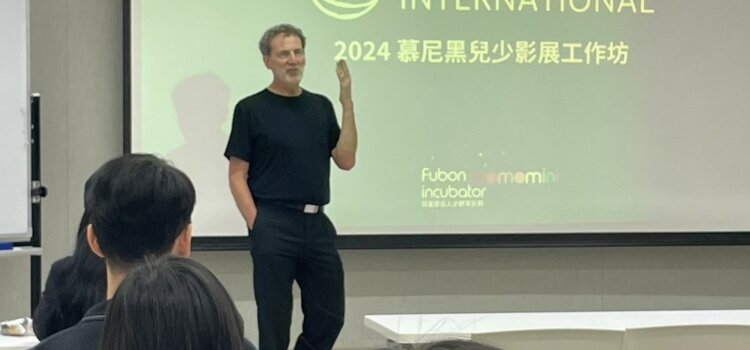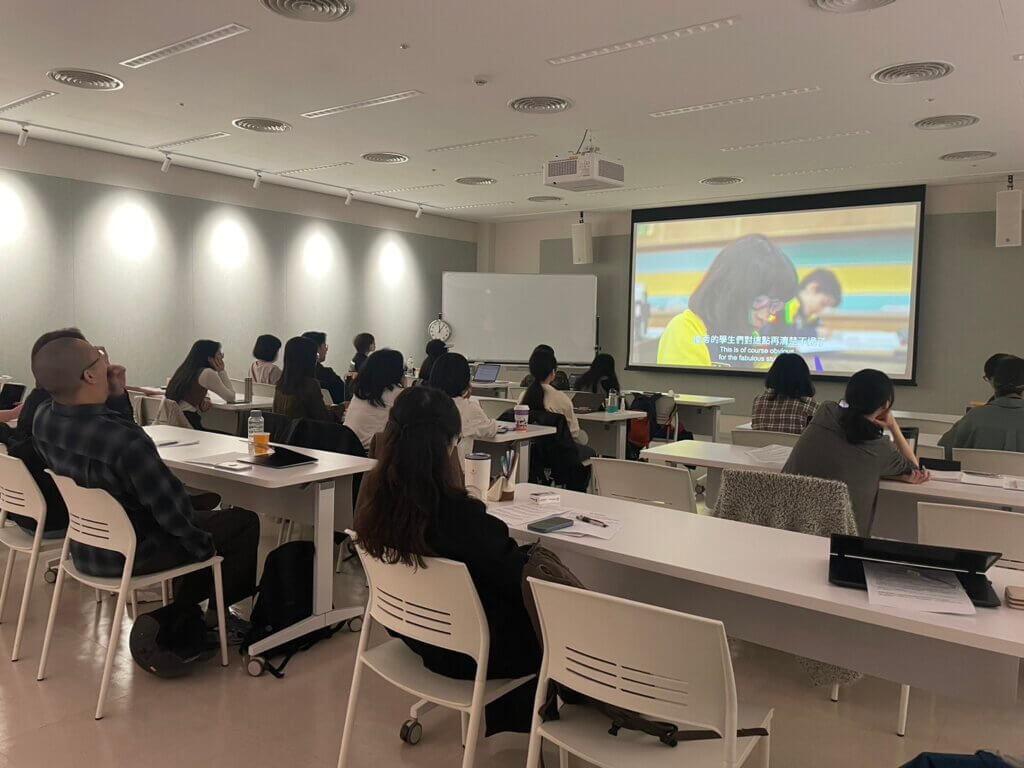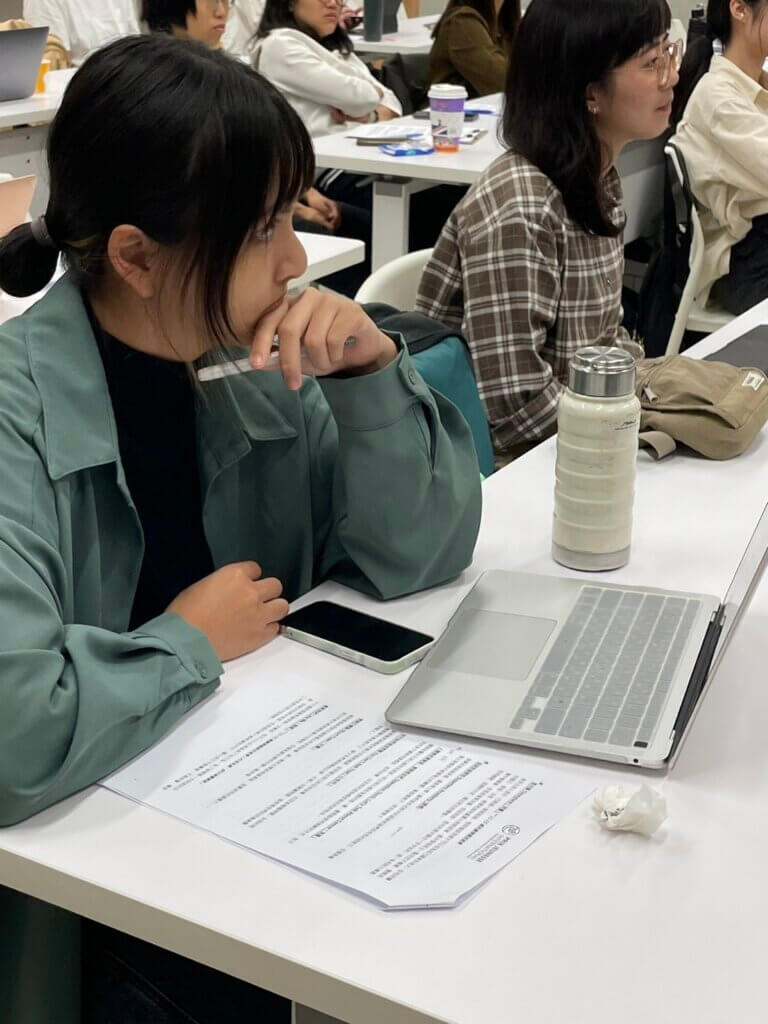
PRIX JEUNESSE Suitcase at the Fubon momomini Incubator Program
A report from Taiwan
The PRIX JEUNESSE Suitcase was held on November 18th, 2024, organized by the Fubon Cultural & Educational Foundation, in the framework of the Fubon momomini Incubator program. We were thrilled to have David Kleeman, a passionate advocate for children’s media, as the event’s moderator. The workshop attracted nearly 30 participants, including seasoned industry professionals and newcomers, making for an engaging and diverse group.


The session began with two programs, Dod Squad from the UK and Clutter in the Courtyard from the Netherlands, which instantly captivated the audience. Clutter in the Courtyard stood out, impressing viewers with its thoughtful script that helped young protagonist Romy explore the emotion of “homesickness” in an authentic and relatable way. A touching dialogue between two characters highlighted their deepening bond and left a strong impression. Participants also reflected on cultural differences, noting that open conversations like those portrayed in the program might be challenging to imagine in Taiwan, where children are often taught to show deference to their friends’ parents.
The second set of films revolved around relationships, featuring works from the Netherlands, Croatia, and Taiwan’s Having Fun in the Mountains, which won the top prize in the 7–10 Non-Fiction category. Discussions touched on themes such as children’s autonomy, a sense of security while watching (how children can explore nature safely while being cared for), and the role of music in storytelling. While all three films competed in the same category, Taiwan’s entry stood out with its portrayal of the bittersweet emotions of regret and independence, as two children were unable to reach the summit.
The third segment showcased the Japanese animated short Wha Wha Wha What’s It All About?! nominated for the Short Film Award, and the Dutch film Timmyland, winner in category 11 – 15 Non-Fiction. The conversations focused on how to introduce democracy to children. Opinions varied on using short rap videos to explain elections—some felt the information was too dense to retain, while David recalled a similar effort from the 1970s in the U.S. with School House Rock. Although the educational content in those animated segments was often forgotten, the accompanying music became a shared memory for an entire generation. When discussing Timmyland, attendees praised its creative and humorous take on democracy, sparking curiosity among young viewers. There were also intriguing discussions about how Timmy would explore the concept of democracy and whether Timmyland could ever be realized. Later, the Norwegian film Superhero Academy inspired a lively debate about its whimsical, comedic style and whether it could hold the attention of children in today’s fast-paced media environment. One participant suggested that the key wasn’t whether kids believed in the Superhero Academy world, but rather if it provided enough entertainment to keep them engaged.
After lunch, the focus shifted to more serious themes, with two films addressing “cancer” for a young audience: Operation Ouch! from the UK, and You Can’t Ask That from Israel. Some attendees appreciated the lighthearted tone of the UK program, which made the topic approachable, while others felt the emotional journeys of teenage cancer patients in the program from Israel might foster deeper empathy. One particularly moving feedback came from a participant who had survived cancer. She expressed her wish for these films to be screened in hospitals. She felt the children’s candid questions and reflections mirrored her own experiences and emphasized the importance of the hope portrayed in the stories.
The final segment tackled adolescent dramas, a rarely explored topic in Taiwan. Two Nordic works, Like Me and Short Fuse, sparked the most intense debates. Like Me employed a bold narrative style, incorporating elements of sex education. David noted how Nordic countries tend to be more open and experimental, while others focus on raising awareness of issues like sexual harassment or inappropriate touching. Meanwhile, Short Fuse prompted discussions on whether emotions such as “anger,” “hopelessness,” and “lack of solutions” were appropriate for teenagers. One attendee mentioned that the storyline eventually shifts to friendship, as the protagonist befriends two victims of bullying. After an eventful day covering topics from preschool content to adolescent dramas, some participants joked they had ” forced to grow up” in a single day. New attendees were especially impressed by the diversity and boldness of children’s programming from around the world.
This November was a landmark month for the Fubon momomini Incubator. We were honored to host a series of lectures and workshops featuring prominent international children’s program producers. Marney Malabar, a seasoned Canadian producer, shared two TVO programs that demonstrated how similar themes can be reimagined through different formats to create unique content. She also engaged with parents and teachers at Taipei Municipal RenAi Elementary School, introducing the foundation’s educational resources and sharing her insights on balancing entertainment and education in children’s programming. David Kleeman from the United States followed with a lecture, PERSPECTIVES ON CHILDREN’S MEDIA, offering insights into recent trends and emerging opportunities in children’s content. His session led into the PRIX JEUNESSE Suitcase workshop. Building on this momentum, we invited Aldana Duhalde from Argentina to lead a workshop on engaging with children, while Jan Willem Bult conducted a session on creating program formats. These workshops aim to foster significant growth in both the quality and quantity of children’s media production in Taiwan.
